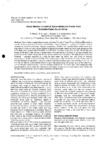Please use this identifier to cite or link to this item:
https://cris.library.msu.ac.zw//handle/11408/1379Full metadata record
| DC Field | Value | Language |
|---|---|---|
| dc.contributor.author | Mtunzi, F. | - |
| dc.contributor.author | Muleya, Eddwina | - |
| dc.contributor.author | Modise, J. | - |
| dc.contributor.author | Sipamla, A. | - |
| dc.contributor.author | Dikio, E. | - |
| dc.date.accessioned | 2016-05-18T09:32:48Z | - |
| dc.date.available | 2016-05-18T09:32:48Z | - |
| dc.date.issued | 2012 | - |
| dc.identifier.issn | 1680-5194 | - |
| dc.identifier.uri | http://hdl.handle.net/11408/1379 | - |
| dc.description | http://www.pjbs.org/pjnonline/fin2171.pdf | en_US |
| dc.description.abstract | Trace metals in eight different plants commonly available in South Africa, Kwazulu-Natal Province namely Gunnera perpensa, Pentanisia prunelloides, Carissa bispinosa, Ledebouria revoluta, Pomaria sandersonii, Eucomis autumnalis, Alepidea amatymbica, Artemisia afra and Berkheya setifera have been quantitatively analyzed using Atomic Absorption spectrophotometer. Medicinal plants were disinfected with 0.1% HgCl2 and digested with 95% H2SO4 and 35% H2O2. Six heavy metals (Fe, Cu, Mn, Pb, Ni, Zn) were chosen on the basis of their effects on human health. From the results of the study, all six heavy metals were present in all the plants, except that Pb was not detected in six of the plants. The highest level of Fe was observed in Gunnera perpensa at 1.12±0.003 ppm whilst the lowest level was found in Alepidea amatymbica at 0.0001±0.00 ppm±0.0005. The concentrations of Mn, Pb, Ni and Zn were all less than 1.5 ppm and the lead concentration in the water extract of Berkheya setifera was found to be high at 5.74±0.110 ppm but still falls below permissible limit of 10 ppm. The concentration of Cu was found to be 1.36±0.0021 ppm in Pomaria sandersonii and lowest in Gunnera perpensa at 1.24±0.002 ppm. The findings generally suggest that the use of these plant species for controlling diseases will not cause heavy metal toxicity and can be of good use to the users in cases of micronutrient deficiency. | en_US |
| dc.language.iso | en | en_US |
| dc.relation.ispartofseries | Pakistan Journal of Nutrition;Vol. 11, no. 9 | - |
| dc.subject | Medicinal plants | en_US |
| dc.subject | Heavy metals | en_US |
| dc.subject | Spectrophotometer | en_US |
| dc.title | Heavy metals content of some medicinal plants from Kwazulu-Natal, South Africa | en_US |
| dc.type | Article | en_US |
| item.openairetype | Article | - |
| item.fulltext | With Fulltext | - |
| item.languageiso639-1 | en | - |
| item.openairecristype | http://purl.org/coar/resource_type/c_18cf | - |
| item.grantfulltext | open | - |
| item.cerifentitytype | Publications | - |
| Appears in Collections: | Research Papers | |
Files in This Item:
| File | Description | Size | Format | |
|---|---|---|---|---|
| HEAVY METALS CONTENT.pdf | Full Text | 80.55 kB | Adobe PDF |  View/Open |
Items in MSUIR are protected by copyright, with all rights reserved, unless otherwise indicated.



